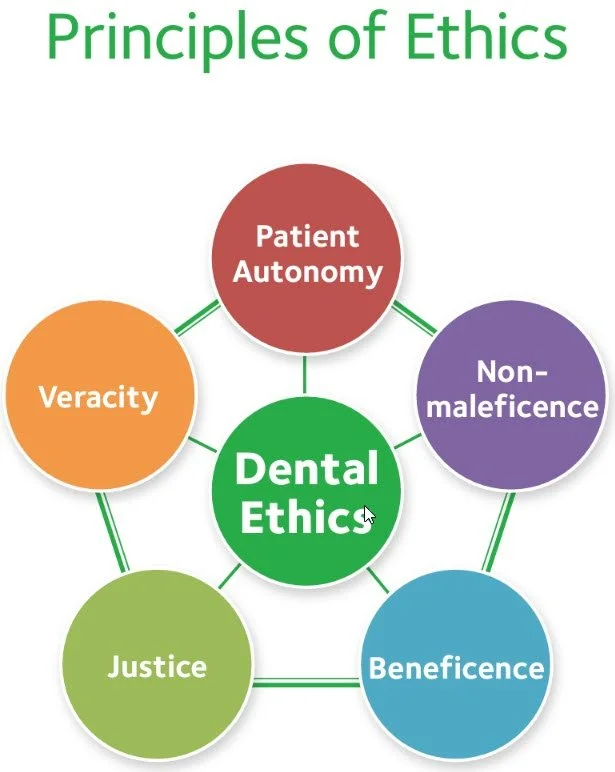5 Ethical Principles That Make Your Dentist Trustworthy:
A Fun Guide to Choosing the Right Dental Care
The day of your appointment is finally here. You’ve brushed, flossed, and are ready to show off those pearly whites. But as you sit in the waiting room, you might wonder, “How do I know if I’ve chosen the right dentist?” Well, let’s explore five key ethical principles from the American Dental Association (ADA) that make your dentist trustworthy. These principles ensure you’re in good hands, no matter where you go.
ADA 5 Principles of ethics, read more at: https://www.ada.org/-/media/project/ada-organization/ada/ada-org/files/about/ada_code_of_ethics.pdf?rev=86aeaa6fb0d0467f8a380a3de35e8301&hash=89BAA88FB9305B8F134414E337CAE55A
1. Patient Autonomy: You’re the Boss!
Imagine this: your dentist hands you a superhero cape because, in their eyes, you’re the decision-maker. Patient autonomy means you have the power to make informed choices about your dental care. A great dentist respects your opinions, provides you with all the information you need, and supports your decisions. They’ll discuss treatment options, risks, and benefits, ensuring you feel confident and in control of your dental journey. Do you feel confident with your decision after discussing all treatment options?
2. Nonmaleficence: First, Do No Harm
Think of nonmaleficence as your dentist’s pledge to be a dental superhero, always fighting for your safety. This principle means your dentist takes every precaution to avoid causing harm. From using sterile tools to staying updated with the latest techniques, a dentist committed to nonmaleficence ensures you’re safe and sound. When your dentist prioritizes your safety, you can relax, knowing you’re in trustworthy hands.
Red flags: f your dentist insists on performing every treatment without referring you to a specialist, it could indicate that they prioritize economic gratification over your well-being. It's unlikely that a single dentist can excel in every area of dentistry, so be cautious if your dentist refuses to refer you to colleagues for specialized treatments.
Here's a simple test: Pretend you want braces and ask who would treat you for that. Then inquire about implants and veneers. If your dentist claims to be able to perform all procedures without hesitation, it's a clear red flag. Remember, a dentist who values your well-being will prioritize your health over financial gains and will readily refer you to specialists when necessary.
3. Beneficence: The Extra Mile
Beneficence goes beyond "do no harm" to actively promoting the well-being of patients. Dentists who adhere to this principle are dedicated to providing the best possible care and are motivated by the desire to help their patients achieve optimal oral health. They stay current with the latest advancements in dental care and recommend treatments that are in your best interest. Beware of dentists who prioritize cosmetic appearance over other important factors, such as bite function or oral health. While a beautiful smile is desirable, it should not come at the expense of your overall dental health.
4. Justice: Fair and Square
Justice in dentistry means everyone gets a fair shake. Your dentist treats all patients with equal care and respect, regardless of who they are and without prejudice. They make sure their services are accessible and fair, ensuring you receive top-notch care. When your dentist embodies justice, you can trust that you’ll be treated with kindness and equality, making your dental visits feel welcoming and inclusive regardless of race, creed, color, gender, sexual orientation, gender identity, national origin or disability.
5. Veracity: Truth Be Told
Veracity is like having a candid conversation with a good friend. Your dentist values honesty and transparency. They’re upfront about your diagnosis, treatment options, and costs. No hidden agendas, no unnecessary procedures. A dentist who practices veracity ensures you’re fully informed and can make confident decisions. When your dentist is truthful, you know your health is their priority.
Dental treatments can often times have complications, if your doctor does not mention them before the procedure, but uses them after as an excuse, his veracity may be put into question. Your doctor should always explain the risks before they happen. Finally, make sure he provides several treatment options regardless of cost, otherwise, it could be a sign that your doctor lacks transparency.
Final notes
Choosing the right dentist doesn’t have to be a daunting task. By understanding these five ethical principles, you can confidently select a dentist who’s trustworthy and dedicated to your care. Remember, a dentist who respects your autonomy, ensures your safety, promotes your well-being, treats you fairly, and is always honest is a dentist you can rely on.
So, next time you’re gearing up for that appointment, you’ll know what to look for. Here’s to a healthy, happy smile with a dentist you can trust!

